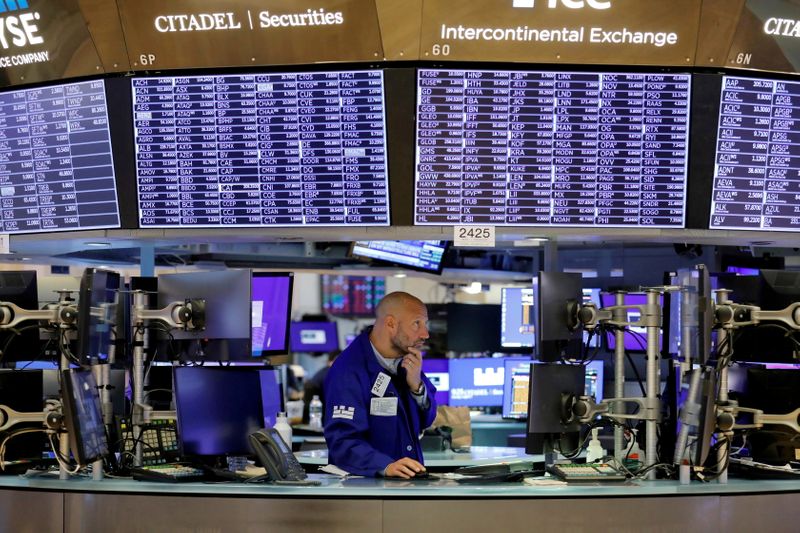By Chibuike Oguh
NEW YORK (Reuters) -Global equity markets dipped on Friday, while the U.S. dollar gained as rising consumer prices bolstered expectations of interest rate hikes even with data showing solid growth in U.S. consumer spending.
Consumer spending, which accounts for more than two-thirds of U.S. economic activity, rose 0.6% in September, the Commerce Department said on Friday, signifying strong consumer confidence as COVID-19 infections fall.
But the data also showed that price pressures remained persistent in September, with the personal consumption expenditures (PCE) price index climbing 0.2%.
Investors overcame bearish sentiment that had weighed on trading following quarterly earnings from technology giants Amazon Inc and Apple Inc on Thursday that both missed Wall Street predictions owing to increased labor costs and operational disruptions that were set to hit their revenues.
“The inflation story slowly morphed into something that we thought to be transitory, and it’s turning out to be more persistent,” said Charlie Ripley, senior investment strategist at Allianz Investment Management in Minnesota.
The MSCI world equities index, which tracks shares in 50 countries, dipped 0.25% to 745.08. European stocks closed 0.07% higher at 475.51 after rebounding from losses early in the day’s session.
On Wall Street, all three major indexes closed higher after trading down for much of the day’s session, driven by technology, healthcare, and consumer discretionary stocks.
Microsoft’s shares touched a record high and neared a market capitalization of $2.5 trillion, surpassing Apple’s market cap of roughly $2.46 trillion.
The Dow Jones Industrial Average rose 0.25% to 35,819.56, the S&P 500 gained 0.19% to 4,605.38 and the Nasdaq Composite added 0.33% to 15,498.39.
“When you look at the bigger picture in equities, the price makers in an inflation environment can pass it to consumers, but price takers have to absorb those input costs, meaning lower profits,” Ripley added.
U.S. Treasury yields dipped from earlier gains, dragged down by concerns over rising consumer inflation for September that further stoked expectations of aggressive monetary policy action from the Federal Reserve to combat the surge in prices.
The benchmark U.S. 10-year yield traded down at 1.5539%.
The dollar index continued to rebound from prior-day losses on news that the Fed’s preferred inflation measure showed prices continuing to rise faster than its 2% target.
The dollar index rose 0.811%, with the euro down 1.03% to $1.1559.
U.S. crude prices settled higher, turning positive after an early decline, supported by expectations that the Organization of the Petroleum Exporting Countries, Russia and their allies, known as OPEC+, would maintain production cuts.
Brent crude rose 6 cents to settle at $84.38, while U.S. West Texas Intermediate crude rose 76 cents, or 0.9%, to $83.57.
Gold prices fell to their lowest level in more than a week on Friday, weighed down by a stronger dollar and rising U.S. inflation.[
Spot gold dropped 0.9% to $1,782.39 an ounce. U.S. gold futures fell 1.30% to $1,783.00 an ounce.
(Reporting by Chibuike Oguh in New York; editing by Jonathan Oatis)

























